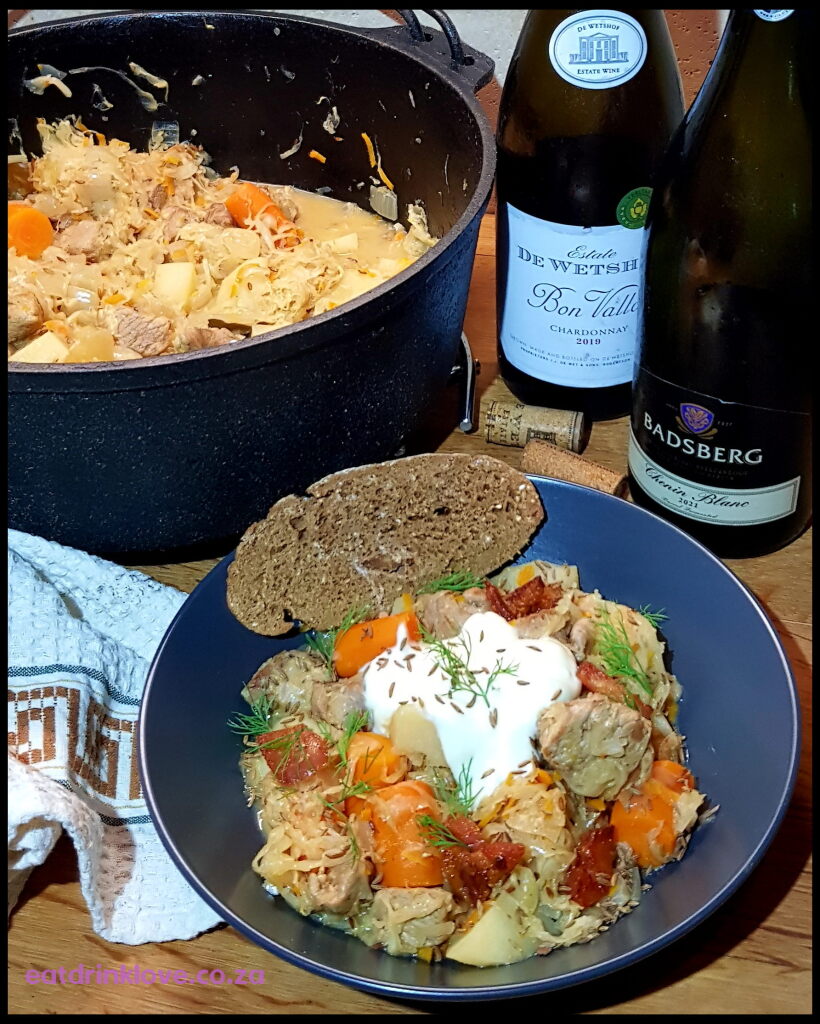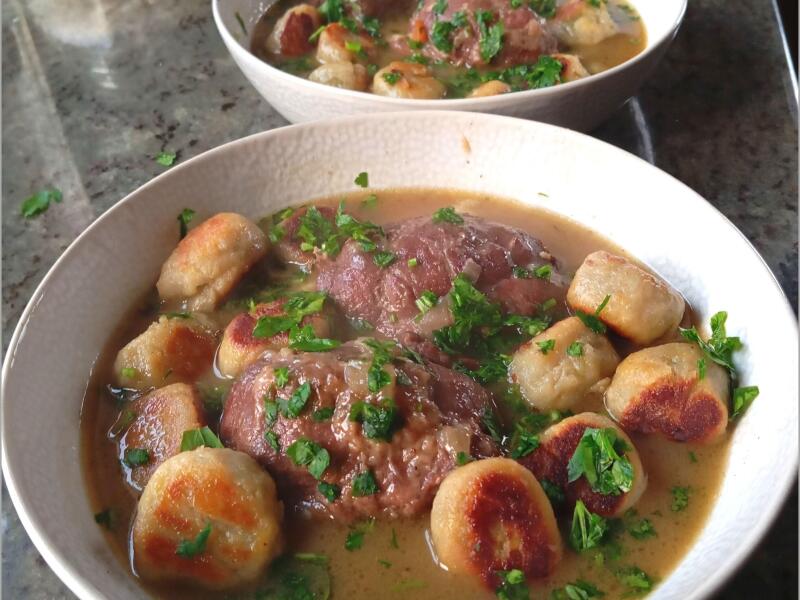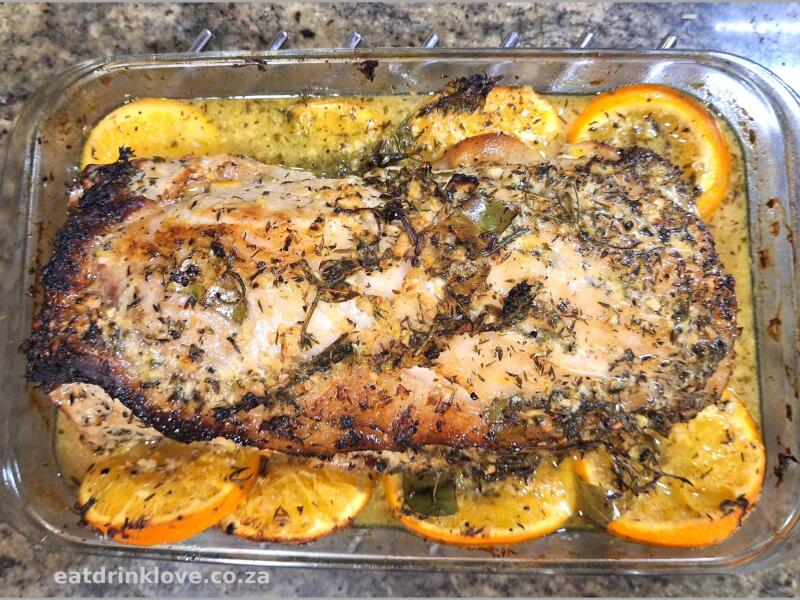In Estonian culinary tradition, Mulgi Kapsad and Must Leib stand as quintessential examples of rustic comfort food. Mulgi Kapsad, a sauerkraut stew, embodies the hearty simplicity of Estonian cuisine, while Must Leib, the country’s traditional black bread, showcases the art of whole-grain baking. These dishes offer a glimpse into Estonian cuisine, where simple ingredients and time-honored techniques come together to create enduring flavors.
Mulgi Kapsad (Estonian Sauerkraut Stew)
In Estonian cuisine, Mulgi Kapsad holds a revered place as a traditional sauerkraut stew that embodies the essence of hearty and rustic flavors. This dish, originating from the Mulgimaa region of Estonia, combines sauerkraut with tender pork, root vegetables, and aromatic spices to create a comforting and nourishing meal. Reflecting the agricultural heritage of Estonia, Mulgi Kapsad showcases the use of simple, locally sourced ingredients and time-honored cooking techniques.
Ingredients
- 150g thick bacon or rashers, cut into 1cm-2cm pieces
- 600g sauerkraut
- 800g deboned pork shoulder, belly or neck, cubed
- 2 medium onions, chopped
- 3 medium carrots, 1 peeled and grated and 2 peeled and cut into 3cm pieces
- 4 medium potatoes, peeled and cut into 2cm-3cm pieces
- 3 Tbsp lard, butter or oil
- 5 bay leaves
- 10 juniper berries
- 10 black peppercorns
- 2 Tbsp caraway seeds, slightly roasted in a dry pan
- 6 cloves garlic, thinly sliced
- 3 cups vegetable broth
- Salt and pepper to taste
- Sour cream and fresh dill for serving
Instructions
Prepare the Sauerkraut: Rinse the sauerkraut under cold water to remove excess saltiness. Squeeze out any excess liquid and set aside.
Crisp the Bacon: In a large pot or Dutch oven, heat the lard, butter or oil over medium heat. Add the cubed bacon and brown until crisp, about 5-7 minutes. Remove the bacon from the pot and set aside.
Brown the Pork: In the same pot, add the cubed pork and brown on all sides until golden brown, about 10 minutes. Remove the pork from the pot and set aside.
Saute the Aromatics: Now add the chopped onions, grated carrots and garlic. Cook until softened, about 7 minutes.
Combine Ingredients: Return the browned pork to the pot. Add the sauerkraut, diced potatoes, diced carrots, bay leaves, juniper berries, black peppercorns, and 1 tablespoon caraway seeds. Pour in the chicken broth, ensuring that the ingredients are mostly submerged. Add water if needed.
Simmer the Stew: Bring the mixture to a boil, then reduce the heat to low and cover the pot. Let the stew simmer gently for 1½ to 2 hours, stirring occasionally, until the pork is tender and the flavours have melded together. If the stew becomes too dry during cooking, add more broth or water as needed.

Finishing: After the stew has cooked through and the potatoes and carrots are soft yet still firm, season with salt and pepper to taste.
Must Leib (Estonian Black Bread)
Must Leib, meaning ‘black bread’ in Estonian, is a traditional bread, made from whole-grain rye and wheat flour and reflects the resourcefulness and resilience of Estonian culture. Dating back centuries, Must Leib has been a staple in Estonian households, cherished for its dense texture, rich flavor, and long shelf life. Prepared using time-honored techniques and natural ingredients, this iconic bread embodies the simplicity and sustainability of Estonian baking traditions.
This specific recipe is made with sourdough starter.

Ingredients
- 650g whole-grain rye flour or normal rye flour
- 650g whole-grain wheat flour
- 1½ Tbsp salt
- 1½ Tbsp sugar
- 2 Tbsp molasses
- 700ml lukewarm water
- 200g sourdough starter
Instructions
Activate the Yeast: In a small bowl, dissolve the sugar, yeast and molasses in lukewarm water. Let it sit for about 15 minutes until it becomes frothy.
Mix Dry Ingredients: In a large mixing bowl, combine the rye flour, whole-grain wheat flour, and salt.
Combine Wet and Dry Ingredients: Make a well in the center of the dry ingredients and pour in the yeast mixture.
Knead the Dough: Gradually incorporate the flour into the wet ingredients. Once the dough starts to come together, turn it out onto a floured surface. Knead the dough for about 10 minutes until it becomes smooth and elastic.
Rise and Rest: Place the dough back into the bowl, cover it with a clean kitchen towel, and let it rise in a warm place for 2 hours.
Shape the Loaf: If you are using an oven, preheat the oven to 200°C. (I used an open fire with a Dutch oven.) Punch down the risen dough and shape it into a round or oval loaf. Place the shaped dough onto a baking sheet lined with parchment paper (or in this case a Dutch oven, lined with parchment paper.)

Final Rise: Cover the shaped dough with a kitchen towel and let it rise for an additional 30-45 minutes.
Bake: Bake the Must Leib in the preheated oven (or open fire) for 45-60 minutes or until it sounds hollow when tapped on the bottom. (When baking over an open fire, ensure to place the lid on the Dutch oven and distribute twice as many coals on top as at the bottom.)

Cooling: Allow the bread to cool completely on a wire rack before slicing
Serve the Mulgi Kapsad hot, garnished with a dollop of sour cream, a sprinkle of fresh dill, some bacon pieces, the rest of the roasted caraway seeds and a generous slice of Must Leib.

We enjoyed this with two great white wines: A 2019 De Wetshof Estate Bon Vallon 2019 Chardonnay and a 2022 Badsberg Barrel Fermented Chenin Blanc. Below are the tasting notes for the Bon Vallon 2022 vintage.
Here is a quick video of the process.



